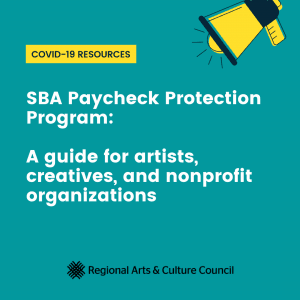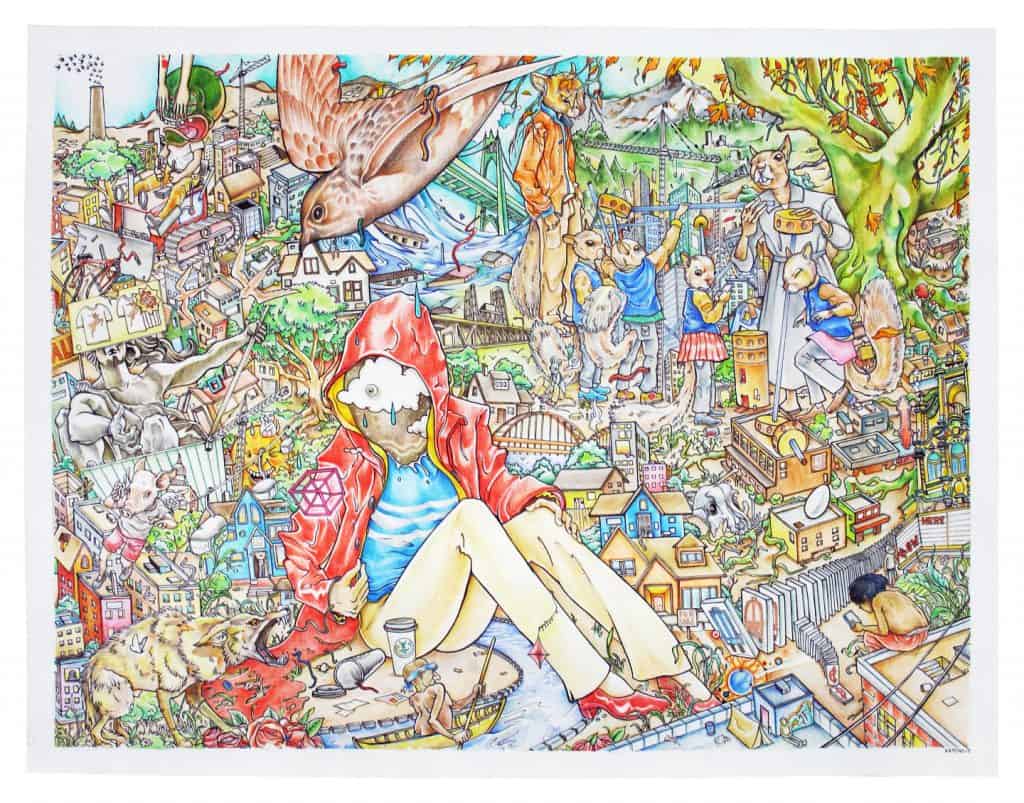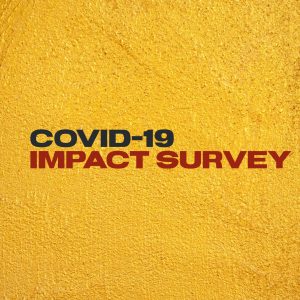
Paycheck Protection Program is reopening – your guide to get ready
In late March, Congress approved the Coronavirus Aid, Relief, and Economic Security (CARES) Act, including $350 billion for a new Paycheck Protection Program (PPP), which provides fully forgivable loans to small businesses and nonprofit organizations, self-employed individuals, and gig economy/contract workers to help pay employees during the economic downturn caused by the COVID-19 pandemic.
The PPP ran out of funding on April 16 before many small businesses were able to submit their applications. Congress has recently replenished the program with an additional $310 billion, and lenders are beginning to accept applications again.
This guide is intended to help artists, creative workers and nonprofit organizations prepare their applications and gather all of the necessary information.
Who is eligible
- Small businesses with fewer than 500 employees, including 501(c)(3) organizations.
- Sole proprietors, independent contractors, gig economy workers, and self-employed individuals who can demonstrate that they received income in 2019.
- Borrowers will need to demonstrate that their business was operational as of February 15, 2020.
Loan amounts
Small businesses and self-employed individuals can borrow 250% of their average monthly payroll expenses, up to a total of $10 million. This amount is intended to cover 8 weeks of payroll expenses, with some for making payments towards other debt obligations (rent, utilities, etc).
Loan forgiveness
Loans will be fully forgiven (you do not have to repay it) after 8 weeks if borrowers can demonstrate:
- At least 75% of their loan was spent on payroll costs, including employee salaries and wages (up to an annual rate of pay of $100,000), paid sick or medical leave, and group health insurance premiums.
- For self-employed individuals, loans can cover wages, commissions, cash tips and other income that is reported in IRS Form 1040 Schedule C or 1099-MISC.
- Up to 25% of the loan principle may also be forgiven if spent on mortgages, rent payments, leases, and utility service agreements.
If you would like to use the Paycheck Protection Program for other business-related expenses, you can, but that portion of the loan will not be forgiven. Loan payments are deferred for 6 months at an interest rate of 1%.
If the borrower’s average number of FTE employees decreases during the period of the loan, the forgiveness amount will be reduced. If you have already laid off some employees, you can still be forgiven for the full amount of your payroll cost if you rehire your employees by June 30, 2020. The forgiveness amount will also be reduced if employee salaries are cut by more than 25%.
How to apply
Applicants must work with lending institutions that have been pre-approved by the Small Business Administration. There are hundreds of eligible lenders in Oregon, including most major banks in the area. Contact your current bank as soon as possible to see if they can assist you with a PPP application, or find a participating lender at https://www.sba.gov/paycheckprotection/find. A list of Portland-area lenders is also available at https://www.sba.gov/sites/default/files/articles/Lender_Listing_4.17.pdf.
You can call your local Small Business Development Center or Women’s Business Center for assistance; see “other resources” below.
Information you will need in order to apply
Your lender will ask you to help fill out a Borrower Application Form (fillable PDF). In order to complete this form, your will need:
- Contact information for your business
- Business Tax ID number or Social Security Number
- Detailed payroll information to help the lender determine your average monthly payroll costs
Organizations should gather the following documents for your lender to expedite the process:
- Bank account number and routing number
- Articles of Incorporation
- Bylaws
- Board-approved budget and financial statements
- Payroll tax filings
- Payroll processor records
- Most recent IRS Form 990
Individuals (sole proprietorships, independent contractors and gig workers) should gather:
- Bank account number and routing number
- IRS Form 1040 Schedule C for 2019. Even if you haven’t filed a 2019 tax return, you will still be required to fill out this form.
- IRS Form 1099-MISC, if appropriate (for freelance workers)
- Payroll tax filings for 2019
- Bookkeeping records, including bank statements and invoices, that provide detail on wages, commissions, cash tips and other income
Individuals will also need to authorize the Small Business Administration to run a criminal background report.
Frequently Asked Questions
Can self-employed individuals and contract workers receive unemployment benefits and a PPP loan at the same time? You should consider the payout of each program to determine which is the best fit for you.
What is the deadline? Applications and required documentation must be submitted by June 30, 2020. Given the competitive nature of this program, we recommend working with your lender to submit your application as soon as possible.
How long does it take to complete an application? The application itself is relatively short, but you may experience delays in getting your lender to complete it and submit it. The sooner you get started, the better off you will be.
How long to I have to spend the funds? Once the loan is funded, you have 8 weeks to spend the money on qualified expenses.
What happens after 8 weeks? You will need to submit a request to the lender who is servicing the loan. The request will include all documents supporting the spending of the funds, number of full-time employees, and compensation levels. The lender will have 60 days to decide on forgiveness.
How much of the loan can be used for rent, mortgage, and utilities? PPP funding can cover these expenses, but remember: if you want to have your loan forgiven, you must spend at least 75% of the loan funds on payroll costs. The remaining 25% can be spent on rent, mortgage, interest and utilities and still be forgiven. Individuals with a home office can claim expenses for the percentage of your home that’s used as a home office.
What happens if I don’t use all the funds on qualified costs? You may be required to pay back all or a portion of the loan, including 1% interest. Interest will accrue on the PPP from day one, even though you will not have to make any payments for six months following the date of disbursement. The interest will only be forgiven on the amount related to the principal forgiven.
If I applied for, or received an Economic Injury Disaster Loan (EIDL) related to COVID19 before the Paycheck Protection Program became available, will I be able to refinance into a PPP loan? If you received an EIDL loan related to COVID-19 between January 31, 2020 and the date at which the PPP becomes available, you would be able to refinance the EIDL into the PPP for loan forgiveness purposes. However, you may not take out an EIDL and a PPP for the same purposes. Remaining portions of the EIDL, for purposes other than those laid out in loan forgiveness terms for a PPP loan, would remain a loan. If you took advantage of an emergency EIDL grant award of up to $10,000, that amount would be subtracted from the amount forgiven under PPP.
Other helpful resources




